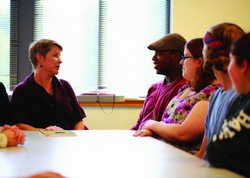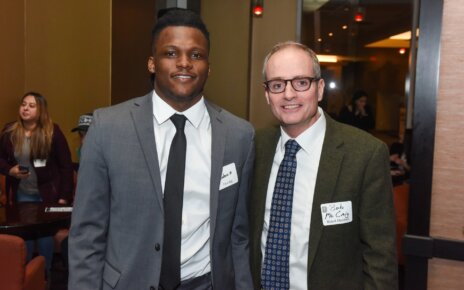Heidi Bludau, Ph.D., a lecturer of history and anthropology, Brooke Nappi, a professor of anthropology, and Michael Anderson-Phillips, Ph.D., a professor of communication, discussed the rise of hate crimes during National Anthropology Day celebrations in Edison Hall on Thursday, Feb. 13.
National Anthropology Day is a part of the American Anthropological Associations annual recognition of the discipline. Monmouth University is one of over 200 institutions nationwide to participate in this program.
Merriam-Webster defines a hate crime as any various crime (such as assault or defacement of property) when motivated by hostility to the victim as a member of a group (such as one based on color, creed, gender, or sexual orientation).
“When people aren’t happy or disenfranchised, they’re going to find a scape goat of some sort. I think we are seeing an increase lately because people feel in our current cultural and political climate that they’re able to, they’re free to,” said Bludau.
She feels that as more people are seemingly getting away with acts of violence towards minority groups, this type of behavior becomes increasingly prevalent, and potentially the norm. “People are angry and looking for something to lash out at. They’re not happy in their lives and looking for belonging. They find unfortunately belonging in hate and hating others,” Bludau explained.
Sierra Sorrentino, a junior anthropology student, said that she hoped to learn how to have productive discourse with people when they say ignorant or hateful words. “Arguing with someone can only get you so far before it turns into unintelligible yelling. I want to be able to remain calm and collected when people speak ignorance and hopefully by keeping my composure I can change their minds,” she said.
“Hate crimes are on the rise. That says a lot about the state of our society. It’s important to take on this issue because everyone deserves to feel safe in their own country. No one should feel unsafe because of what makes them themselves,” said Sorrentino.
To the professors involved, the themes of both Black History Month and National Anthropology Day connected well to the discussion of hate crimes within the United States. “It was one of those things where we didn’t think about it in relationship when we planned it with Black History Month. I think it’s significant to be thinking about it. It’s important to think about the history. Slavery was a hate crime, lynching was a major hate crime. We are seeing these sorts of things and symbols apart of hate today,” said Bludau.
“Hate can [spread] even as many people ignore it. It is a good opportunity for our community to come together to talk about the challenges we face and learn how to solve problems in a pluralistic society,” said Anderson-Phillips.
Brandon Hilf, a junior history and education student, and Sean Becker, a junior finance student experienced hate crime their freshman year in Elmwood Hall. “Our freshman year we both lived on the second floor together and it was a nightmare, but we did actually face some hate crimes being two Jewish kids. I felt really personally attacked,” said Becker.
Hilf explained the incident, that someone had carved a swastika into the wall. “It makes you feel almost afraid to be there when you know somebody that’s willing or capable of doing such awful things is right next door to you,” Becker added.
Anderson-Phillips believes that an event like this might help students realize that they are not alone. He said, “If you have been insulated from these kinds of attacks, the program could let you better understand what is happening to others and how to be an ally. It’s important for an event like this to take place at Monmouth because it is too easy for many in our community to think that things like this don’t happen close to us.”
Bludau feels that the best way for resolving hate crimes is through educating. “Make sure people understand what even small symbols and acts of speech can mean and lead to. Just get people to know people from different groups. Getting to know people who are different from you is oftentimes the best way of recognizing they’re just people, too. We think differently, might believe differently, be attracted to different people, but that does not make me any less human.”
According to Bludau, when people create human connections, humans are less likely to hurt others. “If we make everyone part of the human group, we are less likely to hurt each other for just being something else. This idea that just because someone else belongs to a different group, we can work on getting rid of that,” she explains.
Sorrentino said that she believes the University is trying to bring people of all kinds together but would like to see more people actively participating in meeting different people and learning about their worldview.
The Department of History and Anthropology will continue celebrating National Anthropology Day throughout the week and will have a lecture on understanding race in President Donald Trump’s America featuring Karanja Keita Caroll, Ph.D. an independent scholar at Baruch College, on Wednesday, Feb. 27.
PHOTO COURTESY of Monmouth University



